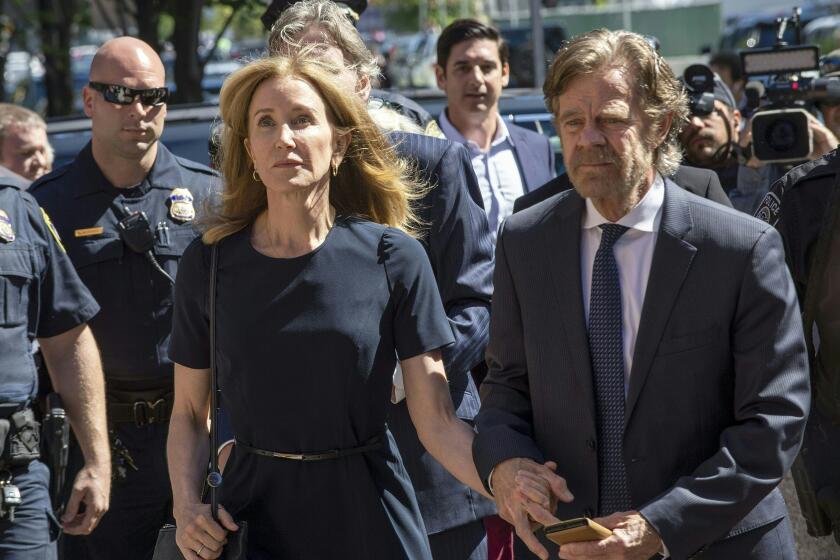‘Operation Varsity Blues: The College Admissions Scandal’ shows how the rich got caught
- Share via
Few news stories have overstimulated our love-to-hate-the-rich receptors as much as the college admissions scandal of 2019, in which authorities uncovered a wide-ranging, industrious scheme (oh right, we hate/love fraudsters too!) whereby wealthy parents cheated their kids into top-tier universities. More than 50 participants were charged in what has been called the largest such case ever prosecuted by the feds.
A scandal that not only delivered true-crime savoriness and thrust CEOs, lawyers, bankers, and Hollywood types into a white-hot spotlight of shame but also underscored disparities in opportunity across society was bound to get the documentary treatment. And most likely from doc-chockablock behemoth Netflix, whose mainlined hits “Frye: The Greatest Party That Never Happened” and “Tiger King” have inspired a term for reveling in the story of a scam unraveled: schaden-fraud.
No wonder, then, that “Frye” director Chris Smith is behind “Operation Varsity Blues: The College Admissions Scandal,” a similarly smooth one-stop retelling of the titular sting, built around the methods of the man at the center of the con: lone-wolf admissions counselor and moneybags-whisperer Rick Singer. Preying on fragilely status-craven parents on one end, and ethically compromised school officials on the other, Singer found what he called a “side door” to steal admissions slots from deserving applicants — through tiny, elite athletics departments (sailing, water polo) where a student recruitment story could easily be faked, and/or using paid test takers to exploit loopholes in the entrance exam rules. In many cases, the kids didn’t know they were being positioned as a star athlete in a sport they’d never played, or that killer ACT/SAT scores weren’t theirs.
Federal prosecutors accused top CEOs, two Hollywood actresses and others of taking part in an audacious scheme to get their children into elite universities through fraud, bribes and lies.
Admissions professionals, journalists and acquaintances of Singer’s — including a woman he dated briefly — tell one part of the story with their comments directly into the camera about our corrosive/lucrative age of college-prep insanity, the reality of admissions inequality (hi, Jared Kushner!) and Singer’s personality filmed in front of the kind of blue-fog backdrop reminiscent of high school class photos. (If intended, touché.) But what anchors Smith’s fraud narrative are the wiretapped conversations between Singer and a handful of the eventually indicted parents, dialogues of grifty salesmanship and casual criminality staged in plush surroundings, headed by a well-cast Matthew Modine as the opaque, persuasive Singer.
It’s a tricky move for a documentary to go the reenactment route. It’s not a nonfiction purity issue so much as an aesthetic choice either evocative or off-kilter. As deployed here, the approach is understandable given the access to the FBI’s transcripts, yet uneven as a dramatic construct. While the performances are fine, and the settings of privilege an appropriate visual reminder of the never-enough mindset being manipulated by a shrewd operator, the distinctions between conversations aren’t always compelling (save the occasionally menacing vibe that you’re in the early scenes in an eat-the-rich horror movie).
The best nuggets come from the interviews, as when a lawyer remarks that when it comes to white-collar criminals, they historically have no filter on the phone. His client, Stanford sailing coach John Vandemoer, who pleaded guilty, is the only indicted person interviewed. Whether or not you believe his defense that he was innocently swept up in Singer’s web, his insights help paint an overall picture of how lax oversight and donation greed readily facilitated bribery inside top schools. Veteran admissions guy Jon Reider makes the salient point that all the application pressure has obscured the fact that great higher education exists everywhere in America.
Most conspicuously absent are emotional details about the kids, probably out of a sense of protecting young lives unwittingly tarnished by their parents’ actions. It’s a fair principle — the movie’s focus is on the crime’s nuts and bolts, and its indictment of an illusory meritocracy in U.S. education — even if that omission represents where the most inherently fascinating behind-the-scenes drama lies.
The exception is a quickie rundown (archivally, not reenacted) of how Lori Loughlin’s and Mossimo Giannulli’s daughter Olivia Jade, because she had a public presence, went from social media influencer to low-lying pariah. The family’s role as the scandal’s A-list villains makes for the most telling clip in “Operation Varsity Blues” in reflecting our insatiable appetite for these stories: an outraged college-age follower of Olivia’s who can barely disguise her glee in hitting “UNSUBSCRIBE.” Slickly entertaining docs like “Operation Varsity Blues,” meanwhile, ensure so gladiatorial a modern thumbs-down won’t happen in the Netflix arena.
'Operation Varsity Blues: The College Admissions Scandal'
Not rated
Running time: 1 hour, 40 minutes
Playing: Available March 17 on Netflix
More to Read
Only good movies
Get the Indie Focus newsletter, Mark Olsen's weekly guide to the world of cinema.
You may occasionally receive promotional content from the Los Angeles Times.








